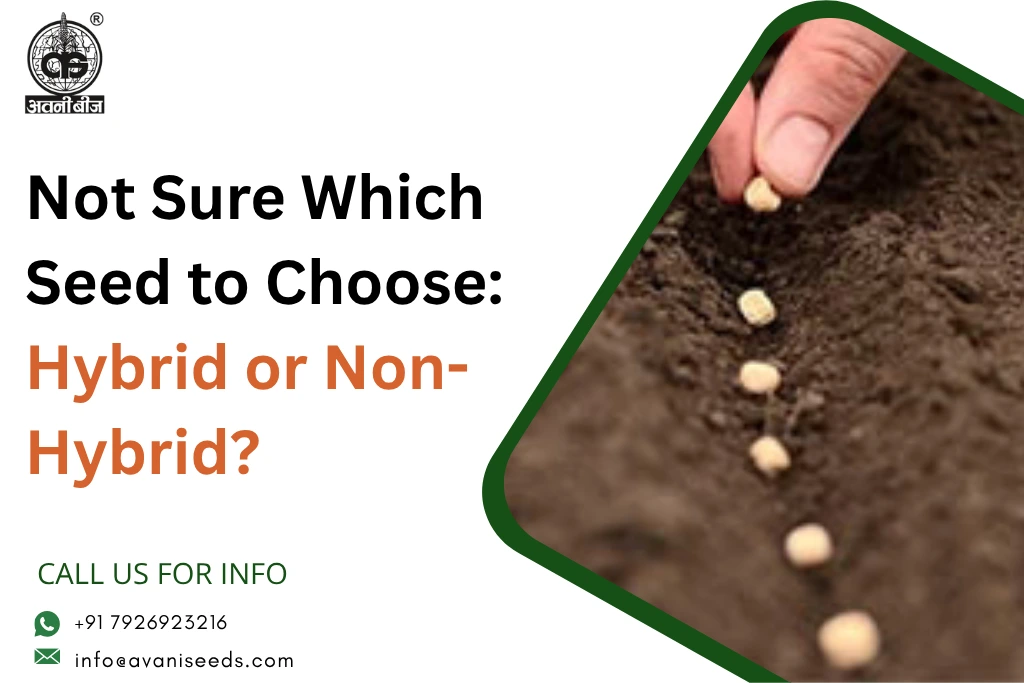When planning your next crop or home garden, choosing the right seeds is the first step toward success. Whether you’re a seasoned farmer or a beginner gardener, you’ve likely faced the common question: “Hybrid or non-hybrid — which seed should I use?”
Understanding the difference between hybrid and heirloom seeds (non-hybrid) helps you make the right decision based on your goals, growing conditions, and preferences. In this blog, we’ll break it down in simple terms and guide you toward the best choice for your garden or farm.
What Are Hybrid Seeds?
Hybrid seeds are created by cross-breeding two different plant varieties to produce offspring with specific desirable traits, such as:
- Higher yield
- Disease resistance
- Faster growth
- Uniform appearance
They are developed through controlled pollination and are widely used by commercial farmers and large-scale growers for consistency and productivity.
However, hybrid seeds do not produce identical offspring if the seeds are saved and replanted. This means farmers need to buy fresh hybrid seeds each season to get the same quality results.
What Are Non-Hybrid or Heirloom Seeds?
Non-hybrid seeds, often called heirloom seeds, are open-pollinated, meaning they’re pollinated naturally by wind, insects, or animals. They are passed down through generations and are valued for:
- Natural, unique flavors
- True-to-type reproduction (you can save and reuse seeds)
- Adaptability to local growing conditions
- Genetic diversity
Heirloom seeds are especially popular among organic gardeners and those who prefer chemical-free farming practices.
Hybrid vs Non-Hybrid Seeds: Key Differences
Here’s a quick comparison to help you understand the hybrid vs non-hybrid seeds debate:
Feature | Hybrid Seeds | Non-Hybrid (Heirloom) Seeds |
Yield | Higher | Moderate but stable |
Taste | Often milder | Rich, traditional flavors |
Seed Saving | Not recommended | Can be saved and reused |
Cost | Usually higher | More economical in long term |
Genetic Stability | Less stable | Genetically stable |
Use | Commercial farming | Home gardens, organic farms |
Best Seeds for Home Gardening
If you’re looking for the best seeds for home gardening, non-hybrid or heirloom seeds are often the top choice. They:
- Are easy to grow organically
- Can be reused each year
- Provide a variety of flavors and colors
- Promote biodiversity in your garden
However, if you want quick results, disease resistance, or plan to grow in a small space with limited time, hybrid seeds might suit your needs better.
Finding Quality Seeds: What to Look For
No matter which type of seed you choose, quality matters. The germination rate, seed purity, and adaptability to local climate all affect your success.
To ensure you get the best results, buy from the best agriculture seeds producers in India or trusted agriculture seeds suppliers in India. Reputed seed companies test for quality, follow scientific standards, and offer support on proper usage.
When choosing a supplier, look for:
- Certification and quality assurance
- Local climate-adapted seed varieties
- Customer support and guidance
- Transparent labeling (hybrid or non-hybrid)
- Availability of organic or untreated options
Some of the best agriculture seeds suppliers in India also provide starter kits for home gardeners, making it easy for beginners to start growing vegetables, herbs, and flowers.
Final Thoughts: Which Seed Should You Choose?
There’s no one-size-fits-all answer. Choosing between hybrid and non-hybrid seeds depends on your specific needs:
- Choose hybrid seeds if you want higher yield, uniform crops, and don’t plan to save seeds. Ideal for commercial growers.
- Choose non-hybrid (heirloom) seeds if you prefer natural growth, seed-saving, and rich taste. Ideal for home gardeners and organic farming.
Understanding the difference between hybrid and heirloom seeds helps you make informed decisions that align with your values, budget, and growing goals.



